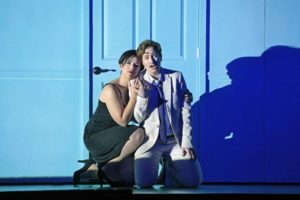
Santa Fe Opera 2017 Review – Alcina: Lead Singers & Director David Alden Lead Satisfying Performance
By Arya RoshanianYou can tell who the real Handel lovers are by those who remain for the entirety of a three hour and 40-minute performance.
However, at Santa Fe Opera’s production of “Alcina” on August 2, the house remained mostly full all the way to the curtain call. When it comes to Baroque performed in the 21st century, it helps to rely on many other dramatic factors to not only lure audiences in but to keep them in their seats. High profile singers, such as South African soprano Elza van den Heever in the title role, were enough to use as bait ― however, it was director David Alden’s brilliant staging that seemed to reel in the line.
Reeling in the Line
Based on a co-production by Opera National de Bordeaux and Teatro Real de Madrid, SFO’s “Alcina” took significant inspiration from a myriad of aesthetics, including English seascapes and vaudeville entertainment. While the two elements may seem mutually exclusive, scenic and costume designer Gideon Davey married both as if it were assumed they belonged together. Add virtuoso Chief Conductor Harry Bicket into the mix and the promise of a hit is inevitable. This may be the most interesting production of “Alcina” in decades.
“Alcina” is based on Ludovico Ariosto’s 1532 poem “Orlando Furioso,” though Handel’s version takes many of its own liberties. In the program notes, Alden states, “In our evolving era of gender fluidity Handel’s exploration of male and female role-playing is particularly striking … you almost need a scorecard to track the complications and gender-bending titillation.” Indeed, Handel was ahead of his time musically, but his representation of social issues may not have been a deliberate decision. And given that gender fluidity is well within our discourse today, it seems only fitting that these elements be focused on in 2017.
The story, though traditionally opera seria, includes plotlines typically found in an English farce. “Alcina” begins with Melisso (Christian van Horn) and Bradamante (Daniela Mack), in disguise as her brother Ricciardo, in desperate search for her fiancée Ruggiero (Irish mezzo Paula Murrihy) who has been lured in and charmed by sorceress Alcina (van den Heever). However, Alcina’s sister Morgana (Anna Christy), also a sorceress, immediately falls for “Ricciardo,” abandoning her own lover Oronte (Alek Shrader). “Ricciardo” then pretends to be in love with Morgana to save herself, resulting in Morgana’s joyous aria “Tornami a vagheggiar.”
At times, Alden’s production is told as a show within a show. He utilized all aspects of the theater ― Mack and Van Horn began the show in the house, before making their way on-stage. They then sat in an Old Hollywood-style theater box for Morgana’s first aria “O s’apre al riso,” anxiously watching while simultaneously on the lookout for Ruggiero. Again, as Morgana sings “Tornami a vagheggiar,” the scene is instantly turned into a Las Vegas show, complete with feathers, satin bustiers and backup dancers.
Meanwhile, the young Oberto (Jacquelyn Stucker) is in desperate search for his father, who, unbeknownst to Oberto, has been turned into a beast by Alcina. Oberto spends the entirety of the opera looking for his father. It is these subplots within the greater picture that add sensitivity to the story.
Ruggiero is finally able to come to his senses, but only after Melisso places a magic ring on Ruggiero’s finger to break Alcina’s spell. Ruggiero reconciles with Bradamante and plans to escape. Alcina, furious, summons the spirits the stop Ruggiero’s escape but is unsuccessful. Morgana reconciles with Oronte, while Ruggerio is confronted with Alcina’s rage. Though Alcina threatens to free the island, she, in turn, tries again to prevent Bradamante and Ruggiero from escaping. Ruggiero destroys the source of Alcina’s magic, freeing the men she turned into beasts, including Oberto’s father.
Solid Ensemble
The company brought in a mix of debut artists and SFO veterans. At the podium, Bicket made sure to savor every moment and every note, particularly within the da capo sections of each aria. The Baroque specialist has always had a knack for Handel, and the balance between the orchestra and singers was even throughout the night.
In the title role, van den Heever was subtle yet poised in her interpretation. Clad in a sleek black dress with a singular pink silk glove, van den Heever used her height to her advantage to intimidate the mortals and sucker them onto her island. Murrihy and Mack were phenomenally matched as Ruggiero and Bradamante. Both are mezzos, yet Murrihy’s voice has more steel, compared to Mack’s warm, luxurious sound. Mack easily had the most challenging music, though she nailed each rapid-fire, coloratura passage with ease.
Both the vocal and dramatic standout of the evening was Anna Christy. Clad in cat-eye glasses and an usher’s uniform, Christy was not only feisty but added a level of sensitivity to her nerdy yet vivacious Morgana. Jacquelyn Stucker, who only last year was an Apprentice with the company, made a strong impression as Oberto. Alek Shrader, another SFO veteran, easily had the most physical staging, yet his vocals weren’t compromised by the demands of the show. Equally as strong was Christian van Horn, whose warm bass-baritone voice and brawny repute served Melisso well.
There are only three additional performances left of “Alcina”. The productions runs until Wednesday, August 23.


